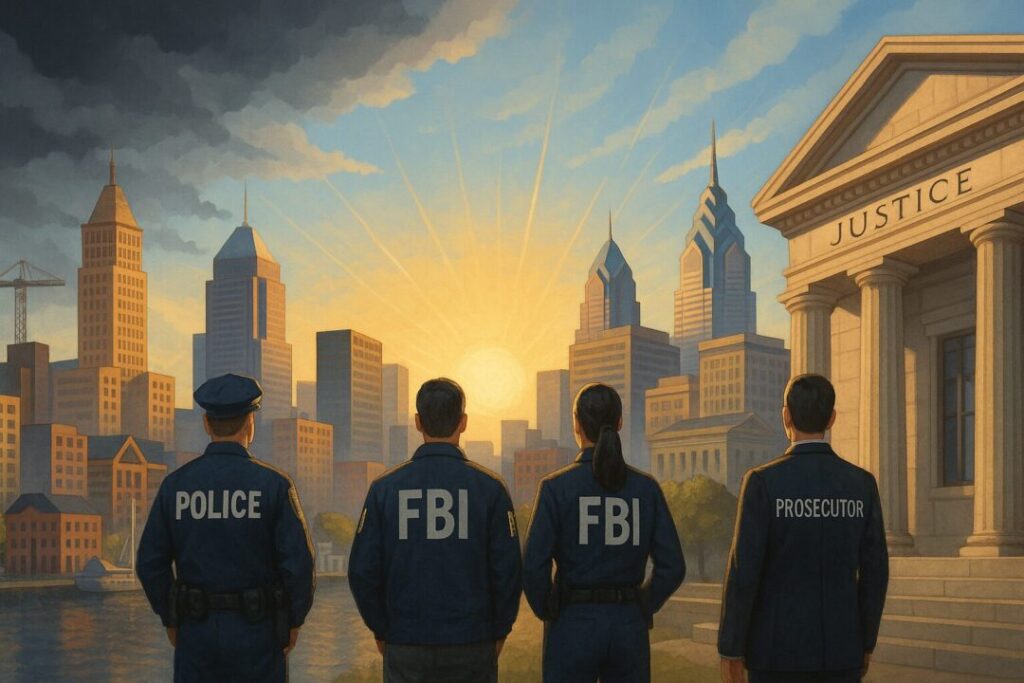Cities like Baltimore, Philadelphia, and others across the country have seen double-digit drops in homicides over the last couple of years.
Baltimore, once one of the most dangerous cities in America, had 23% fewer murders in 2024 than the year before. If the trend holds, 2025 could bring the city’s lowest murder count since 2011.
Philadelphia has also turned a corner. Back in 2021, it hit a grim record with 562 murders. But by 2024, that number dropped nearly 40%.
Nationwide, homicides fell over 11% in 2023, with early numbers for 2024 and 2025 looking just as promising. Some experts say the U.S. could see its lowest murder rate since 1960.
What’s Behind the Drop?
Many conservatives say the reason is simple: cities are finally getting back to basics – tougher policing and holding criminals accountable.
Take Baltimore, for example. After years under soft-on-crime prosecutor Marilyn Mosby, voters put Ivan Bates in office in 2022. Bates made a clear promise: go after repeat violent offenders and clean up the streets.
And he delivered. In just two years, Baltimore’s prosecutors removed 2,129 violent offenders from the community.
That’s more than double the number under Mosby’s last two years. Homicide convictions jumped from 159 to 271, and felony gun arrests climbed as well.
Teamwork That Works
Conservatives also credit smart teamwork between city police and federal agencies.
In Baltimore, the U.S. Attorney’s Office helped crack down on gun crimes, taking on a record number of federal cases. Since 2021, Baltimore’s homicide rate has dropped by 41%.
That’s what happens when you empower law enforcement instead of tying their hands.
And it’s not just local cops making a difference. The 2022 Bipartisan Safer Communities Act gave police more tools to deal with dangerous individuals, especially younger gun buyers.
Conservatives supported the bill because it helped law enforcement do their jobs without stepping on Second Amendment rights.
The results speak for themselves: Baltimore saw a 29% rise in homicide arrests and a 46% rise in auto theft arrests between 2023 and 2024.
What’s a Violence Interrupter?
You might have heard about “violence interrupters”; community members trained to stop conflicts before they turn violent.
Programs like Safe Streets in Baltimore have received millions in federal funding, and local leaders say they’re helping – but conservatives urge caution. They argue these programs are helpful only when paired with strong policing, not in place of it.
In fact, many of these programs were just getting started in 2023, after the murder rate had already begun to drop. And it’s worth remembering that when cities pulled back on policing during the pandemic, crime exploded.
Rafael Mangual of the Manhattan Institute points out that crime rose when police stopped making routine stops and prosecutors had trouble identifying suspects due to widespread mask-wearing.
In other words, when enforcement dropped, crime spiked.
Watch the Money
There’s also concern about how these programs are funded. Many rely heavily on temporary federal dollars, like those from the American Rescue Plan.
But with federal budgets tightening under President Trump, that money may dry up. If these programs can’t survive without a steady supply of government money, they’re not sustainable.
Conservatives argue the real solution is to stick with what works – steady, local control and smart enforcement – not build expensive programs that come and go with every budget cycle.
Yes, it’s great that murder rates are dropping. But this turnaround didn’t happen by accident.
Cities started getting serious about crime again. They hired prosecutors who go after the bad guys. They gave cops the tools to do their jobs. And they focused on people who cause the most harm – repeat offenders with long rap sheets.
Community programs can help, but the foundation of public safety is still law enforcement.
To keep murder rates falling, we need to keep doing what’s working: strong policing, smart prosecution, and real accountability.
This article was written with the assistance of AI. Please verify information and consult additional sources as needed.




